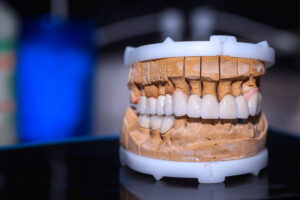If, like 178 million other Americans, you’re missing a tooth, you may have considered replacing the missing one with a dental implant. This tried and true procedure is an effective way to fill in a gap or two in your mouth, not only restoring your full, attractive smile, but providing support to neighboring teeth, stimulating the jawbone, and correcting the issues with speech or eating that a missing tooth could cause. Implants are durable, natural-looking, and best of all, they can last a lifetime if properly cared for. But how can you make sure you’re providing the care they need to last as long as you’d like?
Over 90% of dental implants will last for at least twenty years, and some have been known to last as long as fifty. And while dental implant failure is always a risk, studies indicate that a solid 60 percent of failures happen in the first year of implantation, which suggests that as long the implants are properly placed and heal right, the risk of failure significantly decreases.
If you want to keep your dental implants for life, here are a few general rules you can follow.
Choose the Right Dentist
Remember that most dental implant failures happen in the first year, which suggests that they are affected by a combination of oral health and dentist technique. Not all dentists have the same failure rate. In fact, inexperienced dentists may have a failure rate six times higher than experienced implant dentists. So when you are choosing your implant dentist, pick one with extensive experience. It will give you the best chance of long-lasting dental implants.
Keep Your Teeth Clean
This one may seem obvious, but it’s a major aspect of dental implant longevity: It’s extremely important to perform excellent, consistent oral hygiene at home, and visit your dentist regularly for checkups and cleanings. Not only is brushing and flossing key to keeping your dental implants healthy, you also need to ensure that the rest of your mouth remains healthy. Gum disease is not only the number one reason we lose teeth in the first place, it’s also the number one reason dental implants fail. Keeping up with your oral hygiene is incredibly important for maintaining a healthy smile, and healthy dental implants.
Kick the Tobacco Habit
Smoking and tobacco use may be the biggest threat to dental implants. While your dentist may simply recommend that you quit smoking before you get implants and wait until they’re healed to pick up the habit again, the best way to keep your implants healthy is to quit smoking entirely. And considering that tobacco is bad for your oral health in a number of other ways, too, both your implants and your natural teeth will thank you for kicking the habit.
Watch Your Bite
Bite problems can put undue stress on implants, potentially putting them at risk of failure. To avoid this, you should look for bad bite habits, like chewing on pens or your nails. And if you have bruxism (the habit of grinding or clenching teeth, which can happen during the day, or even at night while you’re asleep), a bite guard could help stop the pressure from causing wear and tear on both your implants and your real teeth. A neuromuscular dentist can also check that you have a healthy, balanced bite.
Do you want to learn more about dental implants in Westchester County? Please contact us today for an appointment with implant dentist Dr. George Sepiashvili or Dr. Wanda Mejia at Advanced Dentistry of Mohegan Lake.





